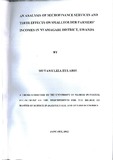| dc.description.abstract | Microfinance In Rwanda is considered as one of the most important and effective
mechanisms in the implementation of the government program to reduce poverty and to
increase economic growth. However, little is known about the effects of microfinance on
smallholder farmers' income in Nyamagabe District of Rwanda. This study sought to
examine the contribution of microfinance services to the income of smallholder farmers in
Nyamagabe District. Descriptive Analysis, Logit Model and Propensity Score Matching were
used to analyze the data. Logit model was used to assess the factors influencing smallholder
farmers' participation in microfinance services while Propensity Score Matching was used to
assess the effect of microfinance services on smallholder farmers' income.
Primary data were collected from 240 respondents randomly selected in the 3 sectors of
Nyamagabe District using structured questionnaires. The results from Logit Model indicated
that Age of a household head, Education, Total annual assets, Savings access, and Off-farm
income significantly influenced the smallholder farmers' decision to participate in
microfinance services. Results from Propensity Score Matching Model using Kernel Based
Matching, showed that the households who had participated in microfinance services had
increased their total annual income by 265;674 Rwandan francs (equivalent to 443 USD)
more than non-participants. From Nearest Neighbor Matching Method results, the households
who had participated in microfinance services had increased their total annual income by
228,246 Rwandan francs (equivalent to 380 USD) more than non-participants.
The study recommends that smallholder farmers should be encouraged by the Private and
Public Institutions to participate in microfinance services because these services have the
potential to increase their income and agricultural productivity. The LIse of SACCOs and microfinance services need to be promoted by the Government in order to provide an instrument for mobilizing savings and extending credit. | en |

